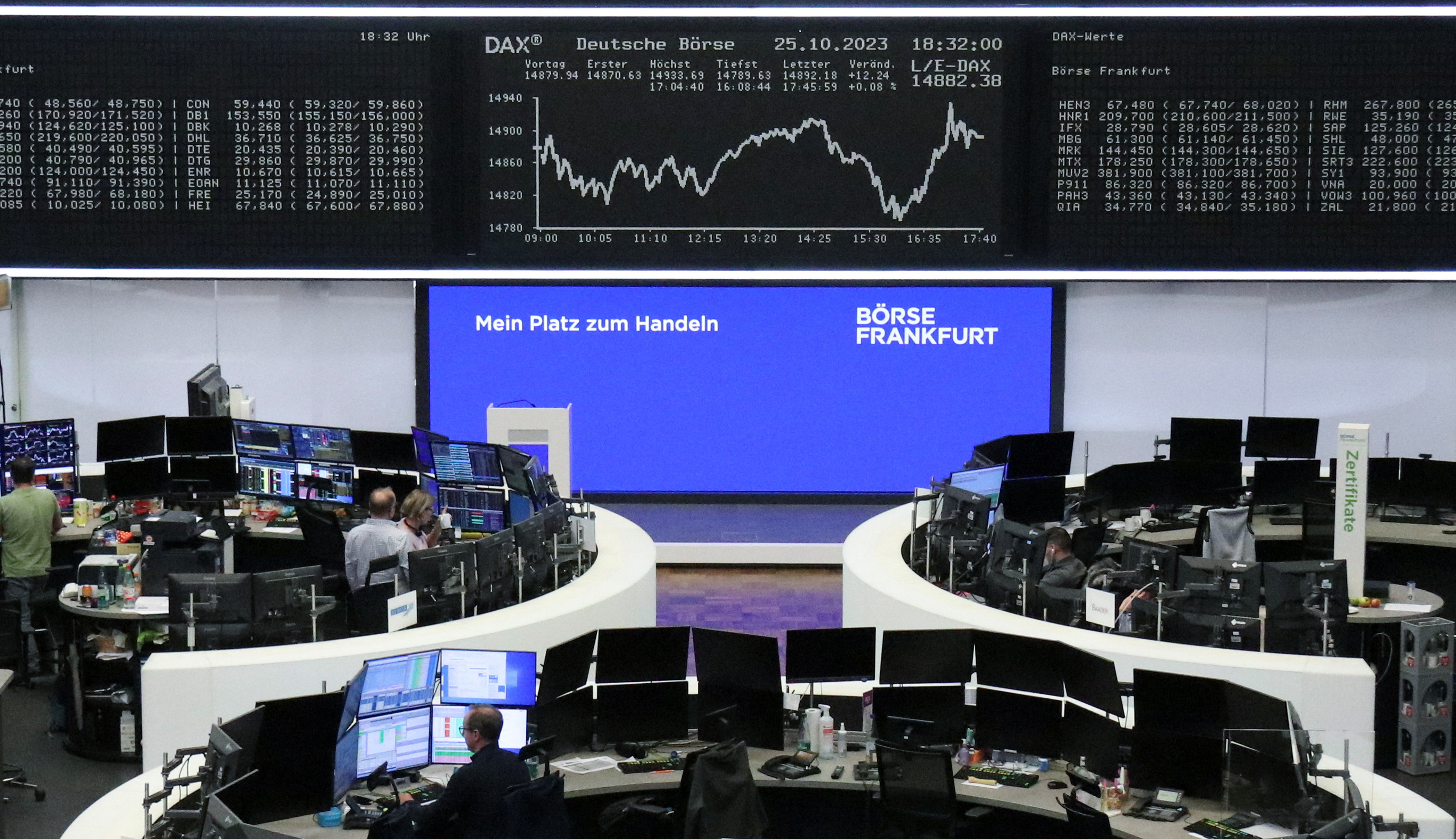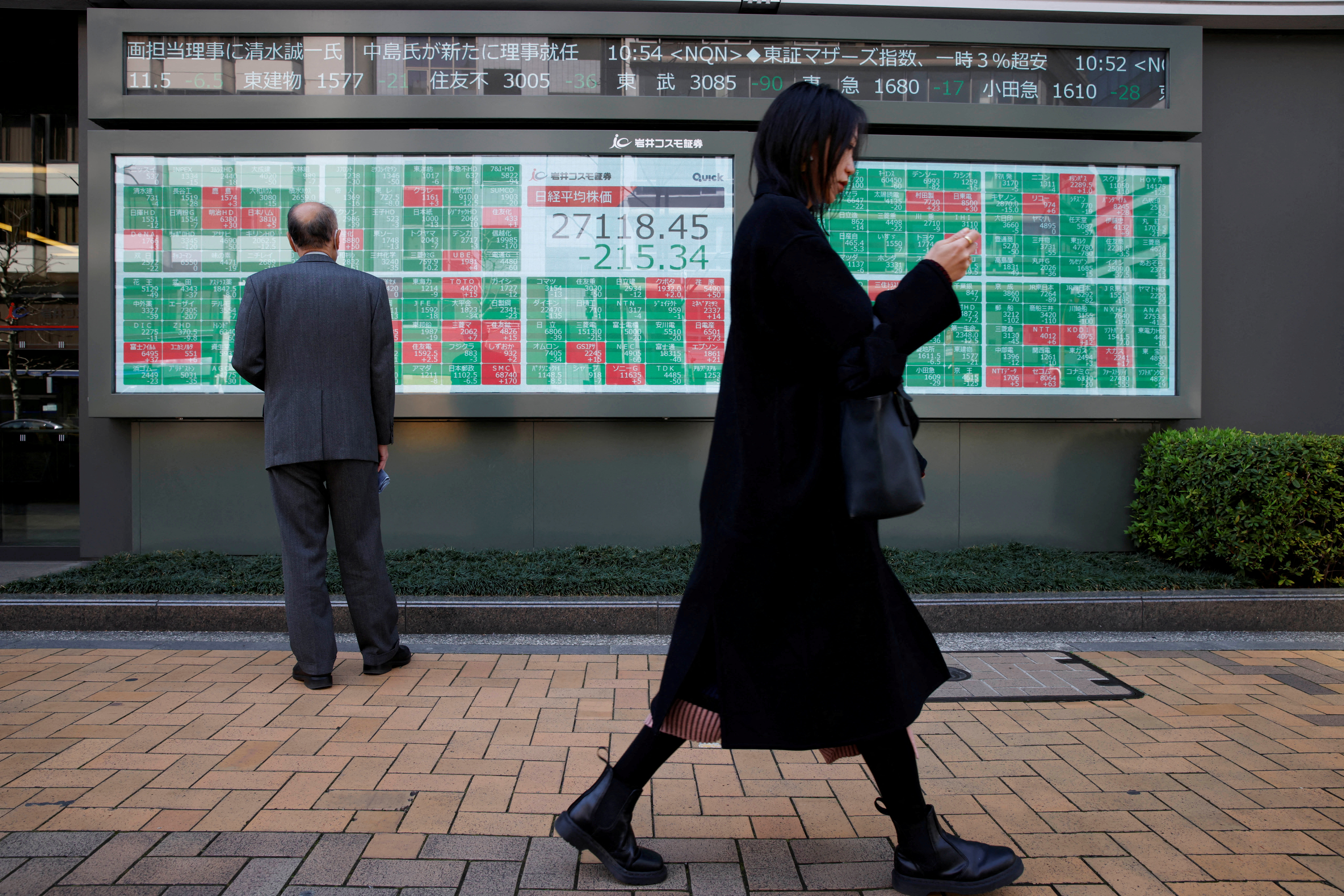U.S. Treasury yields were heading back towards 5% on Thursday, dragging shares around the world to multi-month lows in the middle of a busy week for corporate earnings, with an ECB meeting and the release of U.S. GDP to come later in the day.
A rebound in U.S. home sales and an auction of five-year notes that showed weak demand were the latest trigger for concern in the bond market, which saw the U.S. 10-year Treasury yield rise 11 basis points on Wednesday.
That move continued on Thursday, with the benchmark yield reaching 4.989%, challenging the 5.021% – the highest since 2007 – hit earlier in the week.
“The Treasury market is clearly very much top of mind, the big back-up in yields yesterday appeared to have quite a negative impact on equities as well, so how that evolves and how it reacts to data we have this week will be the big swing factor for global markets,” said Kiran Ganesh, global head of investment communications at UBS Wealth Management.
U.S. third-quarter GDP, released later on Thursday, is unlikely to provide help for the bond market as it is expected to show the U.S. economy grew at its fastest quarterly pace in two years, and so offer nothing to derail expectations the Federal Reserve will keep rates high for longer.
Friday’s personal consumption expenditure (PCE) price index, the Fed’s preferred inflation gauge, is also top of mind, as is Thursday’s European Central Bank meeting, at which the bank is expected to snap a 15-month streak of hikes but keep rates at record highs.
Europe’s broad STOXX index was down 0.8%, just off seven-month lows hit earlier in the week, (.STOXX) and MSCI’s broadest index of Asia-Pacific shares outside Japan (.MIAPJ0000PUS) hit an 11-month low.
U.S. Nasdaq futures were down 1.2% and S&P 500 futures were off 0.7%, even after all three main U.S. benchmarks had closed Wednesday sharply lower.
Ganesh said there were three main things pushing stocks lower.
“High yields are reflecting concerns that rates will have to stay high for longer, and that won’t be good for the economy longer term; high yields are also competing for equity market investment; and the start of the earnings season has been a mixed bag, but generally on the negative side.”
European banks were the big earnings story on Wednesday, with Standard Chartered (STAN.L) at one point falling more than 17% while BNP Paribas (BNPP.PA) fell 4.5% and Swedbank (SWEDa.ST) 7.5% all after results.
The broader European banking index (.SX7P) fell as much as 2.4% to its lowest in four months, with Spain the only positive.
U.S. tech stocks have also been reporting, and Alphabet (GOOGL.O) shares logged their worst session since March 2020 overnight, dropping 9.5% as investors were disappointed with stalling growth in its cloud division.
Meta Platforms (META.O) dropped 2.6% in premarket trading, even after its third-quarter results beat expectations, with the Facebook parent forecasting 2024 spending above estimates and suggesting the conflict in Israel and Gaza could dampen fourth-quarter sales.
Amazon.com shed 1.4% ahead of its results after the closing bell Thursday.
In currency markets, the dollar index hit a two-week high of 106.88, driven by the higher yields, and the yen weakened past 150 per dollar, a level that has put traders on guard for intervention to support the Japanese currency, and to a 10-month low of 150.78 per dollar.
Oil prices slipped after a rise in U.S. crude stockpiles and due to the stronger dollar, though the war in the Middle East loomed large in traders’ minds. U.S. crude dipped 1.73% to $83.88 a barrel. Brent crude fell 1.36% to $88.91 per barrel.
Spot gold rose 0.36% to around $1,986.6 per ounce, testing last week’s five-month high.
($1 = 7.3181 Chinese yuan renminbi)
Related Galleries:


The post Stocks hurt by U.S. 10-year yield“s climb back near 5%, earnings misses first appeared on The News And Times – thenewsandtimes.com.
